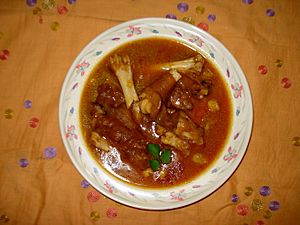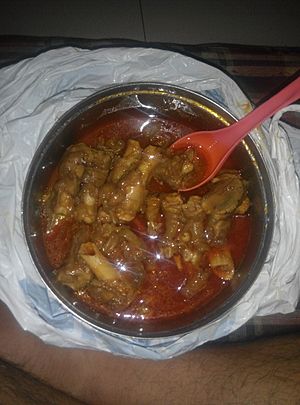Paya (food) facts for kids
|
Paya curry
|
|
| Alternative names | Siri Paya |
|---|---|
| Type | Soup or curry |
| Course | Dinner |
| Place of origin | India, Pakistan, Afghanistan |
| Region or state | Indian subcontinent |
| Main ingredients | Trotters or hoof (goat, beef, buffalo, or sheep), onions, tomatoes, garlic, curry powder and other spices |
Paya is a traditional and tasty dish from the Indian Subcontinent. This area includes countries like India, Pakistan, and Bangladesh. Paya is often served at special events, festivals, or when welcoming important guests. The word Paaya means "legs" in Hindi-Urdu.
The main parts of this dish are the trotters, which are the feet or hooves of animals like beef, goat, buffalo, or sheep. These are cooked slowly with many different spices to make a rich and flavorful meal.
Where Paya Came From
Paya first appeared when cooking styles from South and Central Asia mixed together. In Central Asia, a similar dish was called pacha. Over time, Muslim cooks in cities like Lahore, Hyderabad (in Telangana State), and Lucknow changed the dish to fit their local tastes.
Later, Paya became very popular across what is now India, Pakistan, and Bangladesh. You can also find this dish in restaurants outside the Indian Subcontinent that serve South Asian food. In Delhi, India, it is sometimes called "khurode," which comes from the word "khur," meaning hoof.
How Paya is Made
The way Paya is made can be a bit different depending on the region. To start, onions and garlic are lightly cooked. Then, many curry spices are added along with the meat and bones.
Once cooked, the dish is often topped with fresh, diced ginger and long coriander leaves. Fresh lemon slices are also added for extra flavor.
Cooking Paya Slowly
Paya is known for being cooked very slowly, often for many hours on low heat. Sometimes, it's even cooked overnight on a stove. However, today, many people use a pressure cooker to make it faster.
In the past, when people used wood or coal for cooking, they would start making Paya at night. It would then slow-cook in the warm coals until the next morning. This dish has a consistency like a thick soup. It is usually eaten for breakfast during the colder months, often with naan bread.
Different Kinds of Paya
There are a few different versions of this dish. One common variation is siri paya. In this name, siri means the head of an animal, and paya means the feet. Both siri and paya are considered special and delicious foods.
See also
 In Spanish: Siri paya para niños
In Spanish: Siri paya para niños
 | Georgia Louise Harris Brown |
 | Julian Abele |
 | Norma Merrick Sklarek |
 | William Sidney Pittman |



